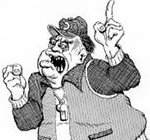If you've been following the last three posts, you'll know that we are tracing the evolution of a profound and moving essay in the hands of a great writer. Starting with a school assignment, What I did on my summer vacation, E.B. White reforms and polishes. Here is his final draft, example courtesy of Richard Nordquist.
Final Revision: "Once More to the Lake" (1941)
White made the return journey in 1936 on his own, in part to commemorate his parents, both of whom had recently died. When he next made the trip to Belgrade Lake, in 1941, he took along his son Joel. White recorded that experience in what has become one of the best known and most frequently anthologized essays of the past century, "Once More to the Lake":
We went fishing the first morning. I felt the same damp moss covering the worms in the bait can, and saw the dragonfly alight on the tip of my rod as it hovered a few inches from the surface of the water. It was the arrival of this fly that convinced me beyond any doubt that everything was as it always had been, that the years were a mirage and there had been no years. The small waves were the same, chucking the rowboat under the chin as we fished at anchor, and the boat was the same boat, the same color green and the ribs broken in the same places, and under the floor-boards the same fresh-water leavings and debris--the dead hellgrammite, the wisps of moss, the rusty discarded fishhook, the dried blood from yesterday's catch. We stared silently at the tips of our rods, at the dragonflies that came and went. I lowered the tip of mine into the water, pensively dislodging the fly, which darted two feet away, poised, darted two feet back, and came to rest again a little farther up the rod. There had been no years between the ducking of this dragonfly and the other one--the one that was part of memory...
After breakfast we would go up to the store and the things were in the same place--the minnows in a bottle, the plugs and spinners disarranged and pawed over by the youngsters from the boys' camp, the fig newtons and the Beeman's gum. Outside, the road was tarred and cars stood in front of the store. Inside, all was just as it had always been, except there was more Coca Cola and not so much Moxie and root beer and birch beer and sarsaparilla. We would walk out with a bottle of pop apiece and sometimes the pop would backfire up our noses and hurt. We explored the streams, quietly, where the turtles slid off the sunny logs and dug their way into the soft bottom; and we lay on the town wharf and fed worms to the tame bass. Everywhere we went I had trouble making out which was I, the one walking at my side, the one walking in my pants.
(One Man's Meat, Tilbury House Publishers, 1997)
Details from White's 1936 letter reappear in his 1941 essay: damp moss, birch beer, the smell of lumber, the sound of outboard motors. In his letter White insisted that "things don't change much," and in his essay we hear the refrain, "There had been no years." But in both texts we sense that the author was working hard to sustain an illusion. A joke may be "deathless," the lake may be "fade-proof," and summer may be "without end." Yet as White makes clear in the concluding image of "Once More to the Lake," only the pattern of life is "indelible":
When the others went swimming my son said he was going in too. He pulled his dripping trunks from the line where they had hung all through the shower, and wrung them out. Languidly, and with no thought of going in, I watched him, his hard little body, skinny and bare, saw him wince slightly as he pulled up around his vitals the small, soggy, icy garment. As he buckled the swollen belt, suddenly my groin felt the chill of death.
To spend almost 30 years composing an essay is exceptional. But then, you have to admit, so is "Once More to the Lake." Postscript (1981)
According to Scott Elledge in E.B. White: A Biography, on July 11, 1981, to celebrate his eighty-first birthday, White lashed a canoe to the top of his car and drove to "the same Belgrade lake where, seventy years before, he had received a green old town canoe from his father, a gift for his eleventh birthday."
Tuesday, September 25, 2007
Subscribe to:
Post Comments (Atom)







No comments:
Post a Comment